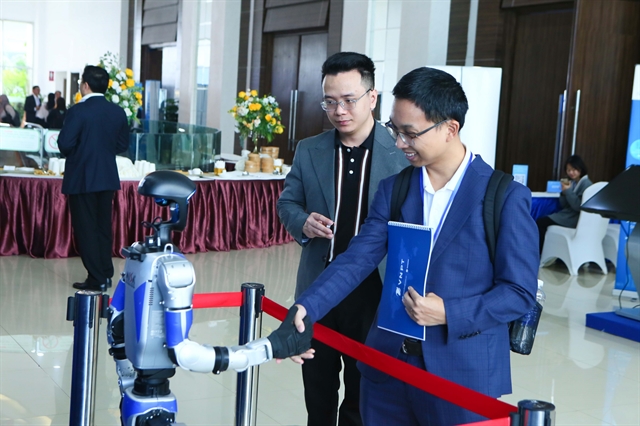 Society
Society


|
| The Vietnam International Digital Week 2025 (VIDW 2025), held from October 27–29 in Ninh Bình and Hà Nội. VNA/VNS Photo |
NINH BÌNH – Nearly 300 delegates representing government agencies, international organisations and leading enterprises convened in Ninh Bình Province on Monday for a ministerial roundtable on artificial intelligence (AI) governance.
The event, hosted by the Ministry of Science and Technology in coordination with the Ninh Bình Provincial People’s Committee, formed part of activities within the framwork of the Vietnam International Digital Week 2025.
The roundtable served as a platform for participants to exchange perspectives, enhance cooperation, and strengthen partnerships between Vietnamese enterprises and global counterparts. Discussions centred on AI institutions, highlighting strategies, policies and legal frameworks to ensure AI development and governance are safe, transparent and responsible.
Minister of Science and Technology Nguyễn Mạnh Hùng emphasised that sustainable AI development must rest on four pillars, namely robust institutions, modern infrastructure, skilled human resources, and a strong AI culture. He noted that the event was not only a policy dialogue but also a forum for stakeholders to share experiences and initiatives in shaping regional and global AI institutions.
Việt Nam, he affirmed, remains committed to people-centred, open, safe, sovereign and inclusive AI development, while promoting international cooperation, knowledge sharing and open-source innovation.
Francine Inarukundo, Permanent Secretary of Burundi’s Ministry of Finance, Budget and Economic Planning, said her country is undergoing a comprehensive digital transformation, viewing telecommunications and ICT infrastructure as the backbone of economic and administrative progress. Despite challenges such as limited electricity access, high device costs and rural connectivity gaps,
Burundi continues to advance digitalisation through initiatives such as the PAFEN project and the Universal Service Fund. She highlighted the African Girls Can Code programme, implemented in collaboration with UN Women, as instrumental in promoting digital skills and gender equality by training girls in coding, emerging technologies and creative thinking.
Chairman of the Ninh Bình People’s Committee Phạm Quang Ngọc said the province has been mobilising resources to implement the Politburo’s resolution on breakthroughs in science, technology and innovation. Ninh Bình has achieved strong foundational results, with fibre-optic coverage across all communes and rapid 5G deployment. Its digital government operates efficiently and transparently, meeting the needs of citizens and businesses alike.
He added that Ninh Bình is ready to adopt advanced technologies, including AI, to address local challenges, from smart heritage conservation and digital tourism to optimising transport, logistics and green agriculture. The province aims to become a centrally governed city by 2030, featuring modern industry, high-quality tourism, and sustainable urban development linked with its cultural heritage. Key priorities include promoting scientific and technological breakthroughs, developing high-quality human resources, and fostering an innovative, interconnected ecosystem to drive entrepreneurship and technology transfer.
The Vietnam International Digital Week 2025 (VIDW 2025), held from October 27–29 in Ninh Bình and Hà Nội, highlights AI governance frameworks and responsible, transparent digital development.
The annual event gathers senior leaders from ASEAN and strategic partners such as the United States, the Republic of Korea and Australia, along with representatives from the United Nations, World Bank, UNESCO, European Union, ITU, APT, and leading global technology corporations.
VIDW 2025 also features outdoor technology showcases and exhibitions highlighting Vietnamese digital and AI innovations, providing opportunities for participants to experience new technologies and explore cooperation and investment prospects.
A series of forums and conferences will address six key areas, namely 5G, digital infrastructure, AI, digital transformation, digital workforce and digital enterprises, fostering stronger business linkages and new avenues for collaboration and investment. VNA/VNS




